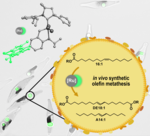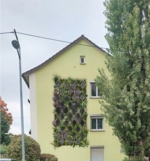Baden-Württemberg and its companies
Bioeconomy refers to the sustainable management of renewable natural resources, which is why there is no such thing as a bioeconomy industry in the traditional sense. However, there are companies in Baden-Württemberg that use biomass as raw material base and have already developed products and processes in their effort to act more sustainably
The energy producer badenova uses male corn plants to produce renewable natural gas (RNG). The company circumvents the food vs fuel conflict as the male plants are only used to pollinate female corn before being discarded. A company called TECNARO from Ilsfeld/Auenstein near Heilbronn has developed a technology that it uses to produce injection-mouldable plastics and fibrous materials from lignin. These materials are already being used in numerous products. The company fischerwerke has developed a wall plug that is partially produced from renewable resources. The wall plug is produced from two-component nylon, and one of the two components is produced from castor oil. Daimler AG's A-Class is equipped with an engine cover that is also produced with a plastic partially made from biological resources.
Companies not only face challenges relating to products, but also concerning innovative production processes. New methods and machines need to be developed in order to be able to use biomass sustainably on an industrial scale. This means that traditional sectors such as the mechanical engineering and plant construction sectors must be made aware and persuaded of the necessity and benefits of the bioeconomy.
Company profiles
-
Diatoms as a biorefinery - 05/05/2023

Renewable raw materials that can be used as alternatives to fossil resources already exist. However, to turn them into everyday products, plant oils and other renewable raw materials not only have to be extracted, but often have to undergo complex chemical processing. Researchers at the University of Konstanz have now converted microalgae cells into tiny refineries to produce and upgrade raw materials, creating a supply of sustainable chemicals.
-
City of the future - 04/04/2023

Resource-efficient water management, photovoltaic modules and innovative facade greening - FamoS is all that. By combining proven elements, the ‘facade module with synergy’ makes a valuable contribution to combatting climate change and boosting climate resilience in cities.
Company foundations in the bioeconomy field
-
Diatoms as a biorefinery - 05/05/2023

Renewable raw materials that can be used as alternatives to fossil resources already exist. However, to turn them into everyday products, plant oils and other renewable raw materials not only have to be extracted, but often have to undergo complex chemical processing. Researchers at the University of Konstanz have now converted microalgae cells into tiny refineries to produce and upgrade raw materials, creating a supply of sustainable chemicals.
-
City of the future - 04/04/2023

Resource-efficient water management, photovoltaic modules and innovative facade greening - FamoS is all that. By combining proven elements, the ‘facade module with synergy’ makes a valuable contribution to combatting climate change and boosting climate resilience in cities.
News of bioeconomic companies
-
Press release - 25/07/2023
Molecular biologist Professor Holger Puchta from KIT is granted funding within a Reinhart Koselleck Project by the German Research Foundation (DFG) for work on specific restructuring of plant genomes. Puchta, a pioneer of green genetic engineering, has used molecular scissors in plants for 30 years now. His new project is aimed at using the CRISPR/Cas method to freely combine genes in crops, thus making Gregor Mendel’s dream come true.
-
Press release - 21/07/2023
Can biosurfactants increase microbiological oil degradation in North Sea seawater? An international research team from the universities of Stuttgart und Tübingen, together with the China West Normal University and the University of Georgia, have been exploring this question and the results have revealed the potential for a more effective and environmentally friendly oil spill response.
Website address: https://www.biooekonomie-bw.de/en/bw/stakeholders/companies

